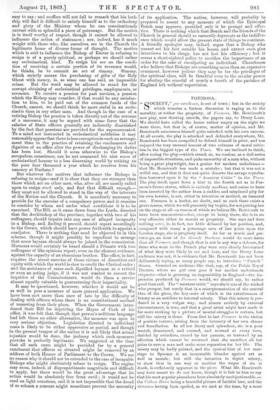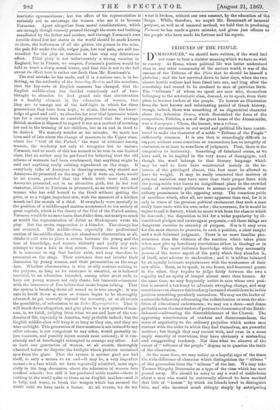FORMOSA.
SOCIETY," par excellence, is out of town ; but in the society- which remains a furious discussion is raging as to the morality, or rather the propriety, of Formosa, Mr. Boucicault's new play, now drawing crowds, the papers say, to Drury Lane. We should have called the house rather empty on the night we were there, but that is, of course, matter of opinion, and Mr.
Boucicault announces himself quite satisfied with his own success.
enjoyed the very unusual honour of two columns of moral critic- ism in the biggest type of the Times. We are inclined to think, after seeing the play—which struck us, we confess, as a dull series of impossible situations, and quite unworthy of a man who, without being a great playwright, has a genius for modern melodrama— that Mr. Boucicault has made a mistake ; but that it was not a wilful one, and that it does not quite deserve the savage reproba- tion bestowed upon it by the " Amateur Critic " iu the Times. The play itself, apart from a hint in the fourth act as to For- mosa's future status, which is entirely needless, and seems to have- been inserted by the author from a sudden and misplaced pity for his own heroine, is not, either in intention or method, an immoral one. Formosa is a harlot, no doubt, and as such there exists a grave reason, which we will presently try to give, for not putting her on the stage at all —a reason of which we believe Mr. Boucicault to have been unconscious—but, except in being there, she is in no way offensive either to morals or propriety. She says and does nothing outré, is, in fact, too little debased by her position, and, compared with many a personage seen of late years upon the London stage, she is propriety itself. As far as words and ges- tures go, an hour of La Grande Duchesse would do more harm than all Formosa, and though that is not in any way a defence, for those who went to the French play were very clearly forewarned of what they were likely to see and hear, and the Drury Lane audience was not, it is evidence that Mr. Boucicault has not been deliberately trying, as many people say, to introduce " French" drama. Granted an audience like that, say, of the Palais Royal Theatre,• where no girl ever goes if her mother understands etiquette—that is granting an impossibility in England—the im- pression produced by Formosa would, we should say, be rather good than evil. The " amateur critic " says she is one of the wicked who prosper, but surely that is a misrepresentation of the central idea of the piece, the key-note of which is the valuelessness of luxury as an antidote to internal misery. That this misery is pro- duced in a very vulgar way, and almost entirely by external circumstances, is true, and that a great artist might have made it far more striking by a picture of mental struggles is certain, but still the misery is there. From first to last Formosa is the victim
of positive torture, arising from the intensity of her own shame and humiliation. In all her finery and splendour, she is a poor wretch, denounced, and coerced, and scorned at every turn, derided by swindlers, cursed by her parents, so tortured by an affection which cannot be returned that she sacrifices all her gains to save a man and make some reparation for her life. The misery may be badly painted, and the cynical hint of her mar- riage to Spooner is an inexcusable blunder against art as well as morals ; but still the intention to depict misery, to show that in one way or another the wages of sin is death, is sufficiently apparent in the piece. What Mr. Boucicault may have meant we do not know, though it is fair to him to say that his most popular pieces have been absolutely unobjectionable,— the Colleen Baum being a beautiful picture of faithful love, and the Octoroon having been spoiled, as we said at the time, by a most inartistic squeamishness ; but the effect of his representation is certainly not to encourage the women who see it to become Formosas. Apart altogether from moral considerations, which are strongly though coarsely pressed through the scorn and loathing manifested by the father and mother, and through Formosa's own terrible dread lest her status in the world should be made known to them, the hollowness of all the glitter, the poison in the wine, the pain felt under the silk, vulgar pain, but real pain, are still too manifest for the play to exercise in that way any deleterious effect. Filial piety is not unfortunately a strong emotion in England, but in France, we suspect, Formosa's position would be held to teach a sharp moral lesson, and that this is not to the full extent its effect here is rather our fault than Mr. Boucicault's.
The real mistake he has made, and it is a serious one, is in be- lieving, on the authority of the Saturday Review and the novelists, that the key-note of English manners has changed, that the English middle-class has decided consciously and of fore- thought to abandon its first grand rule that obscurantism is a healthy element in the education of women, that they are to emerge out of the half-light in which for three generations they have been kept ; to attain, like men, the know- ledge of good and evil ; to abandon for ever that ignorance which has for a century been so carefully preserved that the average British mothea is disposed to regard it not as a method of securing her end in the training of her children, but as an end in itself to be desired. We scarcely wonder at his mistake. So much has been said of late about the change of manners in the Upper class, about the " Girl of the Period," the want of reticence among women, the tendency not only to recognize but to imitate Formosa, and so much of this has seemed to be true in one limited class, that an author may be pardoned for believing that the old scheme of manners had been condemned, that anything might be said and anything really existing reproduced on the stage. if everybody talks of Anonytna in drawing-rooms, why should not Anonyma be presented on the stage? If it were so, there would be no reason, provided that the whole truth were told, and Anonyma presented, not in an attractive garb, but in her real character, either as Formosa is presented, as an utterly wretched woman who has sold herself to the Devil without getting the price, or as a vulgar, impudent slut, with the manners of a kitchen wench and the morals of a thief. If everybody were mentally in the position of a middle-aged matron accustomed to the society of great capitals, which is the theory of the Girl of the Period satires, Formosa would do no more harm thanJuliet does, not nearlyso much as would the representation of Juliet as Shakespeare wrote his play. But the entire supposition is a blunder. The change has not occurred. The middle-class, especially the professional section of the middle-class, has not abandoned obscurantism at all, thinks it still wise to place a screen between the young and the tree of knowledge, and resents violently and justly any rude attempt to tear a hole in that screen. Formosa does tear one. It is nonsense to say that harlots exist, and may therefore be presented on the stage. Their existence does not involve their discussion by young women, and their presentation on the stage does. Whether obscurantism is wise or silly matters nothing to the purpose, so long as its existence is essential, or is believed essential, to an education intended, among other great ends, to keep our young women not only chaste, but innocent—innocent with the innocence of Eve before that snake began talking. That the system is breaking down all round us is true enough ; it was sure to break down as soon as women began to be thoroughly educated, to get mentally beyond the necessity, or at all events the possibility, of submission to an Index Expurgatorius. That it will break down altogether, and give place to a new system of man- ners, is, we think, judging from what we see and hear of the ten- dencies of life, especially in America, very probable indeed ; but the English middle-class will keep it as long as they can, and they are wise and right. This generation of their matrons is not trained to any other scheme, is not competent to any other, would probably in- jure manners, and possibly injure morals most seriously, if it con- sciously and of forethought attempted to manage any other. Let us have one generation of women, at all events, thoroughly educated before we disperse the twilight which protects untrained eyes from the glare. That the system is neither good nor bad itself, is only a means to an end—it may be, a very imperfect means—is a fact which we have repeatedly admitted, more espe- cially in the long discussion about the admission of women into medical schools; but still it has produced noble results—there is nothing in the world quite so clean as an English maiden—and it is folly, and worse, to break the weapon which has secured the result until we have made a better. At all events, we do not want it broken, without our own consent, by the education of the Stage. While, therefore, we acquit Mr. Boucicault of immoral purpose, as well as of immoral method, we hold that in producing Formosa he has made a grave mistake, and given just offence to the people who have made his fortune and his repute.































 Previous page
Previous page